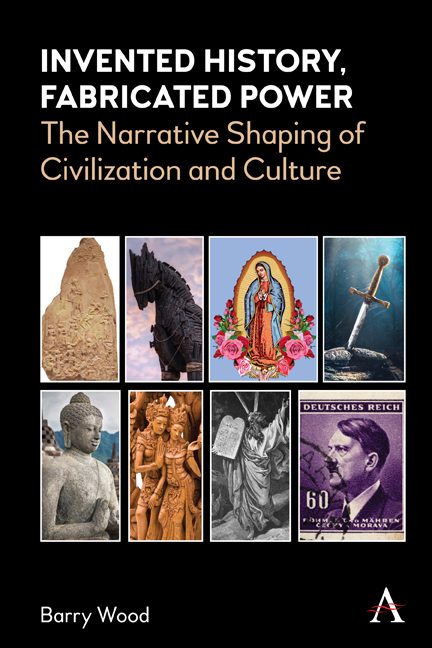Book contents
- Frontmatter
- Dedication
- Contents
- Acknowledgments
- About the Cover
- List of Abbreviations
- Introduction
- Prologue: The Prehistory of Power: Souls Spirits, Deities
- Part One Kings and Emperors
- 1 Divine Kingship in Mesopotamia
- 2 Pharaohs among the Indestructibles
- 3 Kingship among the Hebrews
- 4 The Deification of Roman Emperors
- 5 The Deva-Rajas in India and Southeast Asia
- 6 The Chinese Mandate from Heaven
- 7 The Japanese Imperial Cult
- Part Two Empires before the Common Era
- 8 The Legendary Empire of the Sumerians
- 9 Legendary Empires of Preclassical Greece
- 10 Patriarchs, Exodus, and the Epic of Israel
- 11 Legendary Empires of Ancient India
- 12 The Legendary Founding of Rome
- Part Three Founders
- 13 Moses: The Israelite Lawgiver
- 14 Buddha and Legends of Previous Buddhas
- 15 The Savior Narratives
- 16 Muhammad, the Qur’an, and Islam
- 17 The Virgin Mary through the Centuries
- 18 Tonantzin and Our Lady of Guadalupe
- Part Four Empires of the Common Era
- 19 Narrative Inventions of the Holy Roman Empire
- 20 The Epic of Kings, Alexander the Great, and the Malacca Sultinate
- 21 The Franks, Charlemagne, and the Chansons de Geste
- 22 The Legendary Kingdom of King Arthur
- 23 Ethiopian Kings and the Ark of the Covenant
- 24 Narratives of the Virgin Queen
- Part Five Ideologies
- 25 Discovery: The European Narrative of Power
- 26 Epics of the Portuguese Seaborne Empire
- 27 Dekanawida and the Iroquois League
- 28 The New England Canaan of the Puritans
- 29 The Marxist Classless Society
- 30 Adolph Hitler: Narratives of Aryans and Jews
- Epilogue: A Clash of Narratives
- Bibliography
- Index
- About the Author
8 - The Legendary Empire of the Sumerians
Published online by Cambridge University Press: 15 December 2020
- Frontmatter
- Dedication
- Contents
- Acknowledgments
- About the Cover
- List of Abbreviations
- Introduction
- Prologue: The Prehistory of Power: Souls Spirits, Deities
- Part One Kings and Emperors
- 1 Divine Kingship in Mesopotamia
- 2 Pharaohs among the Indestructibles
- 3 Kingship among the Hebrews
- 4 The Deification of Roman Emperors
- 5 The Deva-Rajas in India and Southeast Asia
- 6 The Chinese Mandate from Heaven
- 7 The Japanese Imperial Cult
- Part Two Empires before the Common Era
- 8 The Legendary Empire of the Sumerians
- 9 Legendary Empires of Preclassical Greece
- 10 Patriarchs, Exodus, and the Epic of Israel
- 11 Legendary Empires of Ancient India
- 12 The Legendary Founding of Rome
- Part Three Founders
- 13 Moses: The Israelite Lawgiver
- 14 Buddha and Legends of Previous Buddhas
- 15 The Savior Narratives
- 16 Muhammad, the Qur’an, and Islam
- 17 The Virgin Mary through the Centuries
- 18 Tonantzin and Our Lady of Guadalupe
- Part Four Empires of the Common Era
- 19 Narrative Inventions of the Holy Roman Empire
- 20 The Epic of Kings, Alexander the Great, and the Malacca Sultinate
- 21 The Franks, Charlemagne, and the Chansons de Geste
- 22 The Legendary Kingdom of King Arthur
- 23 Ethiopian Kings and the Ark of the Covenant
- 24 Narratives of the Virgin Queen
- Part Five Ideologies
- 25 Discovery: The European Narrative of Power
- 26 Epics of the Portuguese Seaborne Empire
- 27 Dekanawida and the Iroquois League
- 28 The New England Canaan of the Puritans
- 29 The Marxist Classless Society
- 30 Adolph Hitler: Narratives of Aryans and Jews
- Epilogue: A Clash of Narratives
- Bibliography
- Index
- About the Author
Summary
The Sumerians were the first to develop a writing system and the first civilization to create permanent records that were inscribed on clay tablets dating from approximately 3000 BCE (Kramer 1963, 302). Thousands have been acquired by the Louvre, the British Museum, and the Ashmolean, with the largest number, excavated at Nippur, located at the Museum of Archaeology and Anthropology of the University of Pennsylvania. So meticulous were these Sumerian scribes that they produced library catalogs. Copies from the second millennium BCE include hymns, myths, epic tales, and lamentations transcribed under later Mesopotamian civilizations, originals of which are no longer extant (Kramer 1961, 226–27).
The prominence of Uruk dates from 3500 to 3000 BCE, so early that Marc Van de Mieroop treats it as the main exhibit for the origins of cities (2004, 20–28). However, the iconic institution of divine kingship at Uruk developed some centuries later, thus indicating later fabrication of a narrative of origins to establish its supremacy. The original historical importance of Uruk lies elsewhere. What de Mieroop calls “the Uruk phenomenon” includes its status as the first great city of ancient times, the first to develop an efficient urban administration, the first to develop a system of writing, and the first to establish a formal system of education that was tiered on the invention of writing (2004, 19–38).
Uruk's origin as a village goes back to the seventh millennium BCE. Its success was founded on a rich alluvium in the Lower Mesopotamia valley that was suitable for agriculture and animal husbandry. But over several millennia, increases in population and societal development added material needs well beyond agriculture that Southern Mesopotamia was ill suited to provide. The result was “the Uruk Expansion,” a term first used by Guillermo Algaze (1989) to describe the cooperative economic system that developed between Uruk, located on a resource-deprived alluvium plain of Southern Mesopotamia and resource-rich regions to the east and north. The result of this expansion was an empire, resulting from a gradual expansion of economic exchange between the heartland communities of the southern valley and the surrounding highlands.
- Type
- Chapter
- Information
- Invented History, Fabricated PowerThe Narratives Shaping Civilization and Culture, pp. 93 - 100Publisher: Anthem PressPrint publication year: 2020



